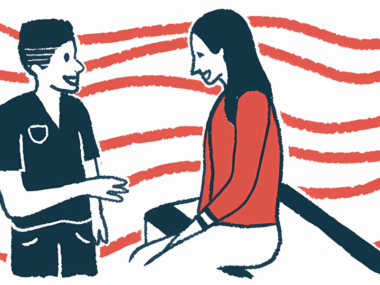The Possibilities That Arise From Adaptability
Written by |

Celebrating the recent holiday here in the U.S. tested our ability to adapt. It has always been a time for the family to gather, but not this year. Our family members decided not to congregate in a physical space. Instead, we adapted, connected through video, spoke on the phone, and maintained a safe connection with loved ones.
In these times, I really rehabilitate my training to adapt. There are days when the disease invades every fiber of my existence, transforming me into something I do not recognize. Stress just makes everything worse. The disease never lets up, always presenting something that needs some new form of accommodation.
Adaptation can improve our mental health. While some of us manage to adapt to our physical disability’s implications, others may fail to accept this new situation, manifesting depressive symptoms. I never let go of the possibilities that can come from adaptation and reasonable accommodations.
The spectrum stage theory for Parkinson’s disease describes the importance of conductor/exercise training and of shifting perspective. Finding new ways to adapt and build creative accommodations to live better with a chronic illness is aided by shifting perspective.
Creative solutions to difficult problems often come from taking a step back, shifting to a new perspective, and discovering a new way of doing things. The spectrum stage theory is a shift in perspective from the classic view of Parkinson’s disease. Within this shift in perspective of the disease are new possibilities for adaptation and lifestyle changes.
A study, published in the journal Ecology and Society, states:
“Transformation involves novelty and innovation. Transformational change at smaller scales enables resilience at larger scales, while the capacity to transform at smaller scales draws on resilience at other scales. Thus, deliberate transformation involves breaking down the resilience of the old and building the resilience of the new.”
Humans have been blessed with a large prefrontal cortex. If you put headphones on, you can easily visualize your prefrontal cortex sitting in front of the headphones. Its main function is to help us adapt to our environment so that we may survive and thrive in even the harshest conditions, from the Arctic to the Amazon.
The gift of adaptability has given us tools, language, and cultural advancement, allowing us to specialize using our well-developed prefrontal cortex. Given the plastic nature of the human brain, we all have the potential to strengthen our adaptability through appropriate conductor/exercise training.
Dealing with chronic illness is difficult, but creative accommodations can make it easier. The next step with the spectrum stage theory of Parkinson’s disease is to apply the information. You can design creative accommodations using the theory as a foundation. Each person with Parkinson’s disease will need to be an active participant in the design of their own brain rehabilitation.
This is one of the reasons why conductor/exercise training is so important. The only person who really understands where you fall on the spectrum of the disease, and what your specific needs are due to the illness, is you, the person living with the illness.
How the human brain functions lies behind the conductor/exercise training. I propose to help people with Parkinson’s learn creative accommodation design. When you are an integral part of rehabilitation design, a successful outcome is more likely.
We must be adaptable and flexible almost all the time, because we never know how bad Parkinson’s will be on a given day. That’s one accommodation. We must be willing to say, “I can’t do that today. Maybe tomorrow.”
Creative accommodations don’t have to be huge. I have a small process when getting dressed. I lean against a wall on the opposite side of the leg that’s going into the pants. This supports my body while freeing up my leg to navigate into one side of the pants.
Then, I shift to the other side and lean against the wall while putting on the other pant leg.
Sitting down to put on pants does not seem to work as well these days. Bending over off the bed tends to create a gravitational pull that throws me off balance. The wall is my accommodation for full-body support during this activity. It is a little thing, but it sure helps.
The spectrum stage theory of Parkinson’s disease suggests that there is a wide range in the way the disease affects people. It is logical then to assume there will be a wide range of creative accommodations for each person.
Please use the comment section below to share the accommodations that have made living with the disease easier for you. I would really like to see what you are doing — perhaps they’re good suggestions for me to use!
***
Note: Parkinson’s News Today is strictly a news and information website about the disease. It does not provide medical advice, diagnosis or treatment. This content is not intended to be a substitute for professional medical advice, diagnosis, or treatment. Always seek the advice of your physician or another qualified health provider with any questions you may have regarding a medical condition. Never disregard professional medical advice or delay in seeking it because of something you have read on this website. The opinions expressed in this column are not those of Parkinson’s News Today or its parent company, Bionews, and are intended to spark discussion about issues pertaining to Parkinson’s disease.






Jim
"We never know how bad Parkinson's will be on a given day." How true and often I forget that which often leads me to either pushing myself too far or cutting myself short of what I can do out of fear. Striking the balance of adaptability is a dance I am still learning in this early stage of having this cunning and baffling disease. And so the game of chess continues....
Dr. C
Hi Jim ~ You have hit the nail on the head! I find myself waking up each morning (and my partner with me), saying, "I hope today is a good day". For me the disease was a lot more baffling prior to my theory which is explained in the column. For me making sense of the illness helps me to live with it better. I set better expectations, don't berate myself so often during the bad days, and enjoy the good days when they return. I hold on to the idea that the good day will come back again.
Thanks for your comment, thanks for reading my columns and checking in with BioNews. It provides such an encouragement to me -- that I'm not isolated in my dance with the disease.
Dr. C.
Pramesh Ratnakar
Now then can typing go hand in hand with PD?
Why not have the option for recording comments as well?
A little thing, but could trigger rich interactions.
Adaptibility?
Dr. Ratnakar
Pramesh Ratnakar
Dear Dr. C
Enjoy reading your column and your comments- and joy within should
lead to fun
without!
So then here i go 'adapting'W.B.Yeats
' It must go further still:that PD must become
Its own betrayer, its own deliverer
The one activity
The Mirror turn Lamp.'
And with ref to the metaphor at the end of your comment, deliberately not adapting Yeats:
O body swayed to music, O brightening glance
Who can separate the dancer from the dance?'
Pramesh Ratnakar